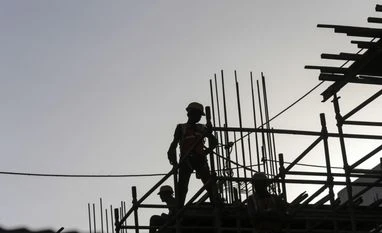Budget watch: Real estate sector wants industry status, tax relief
The sector also expects the Centre to provide measures, including tax breaks, to boost the demand for affordable housing, generally priced below Rs 50 lakh
)
Affordable housing is a house or flat with a carpet area up to 90 square metres in non-metropolitan cities and towns, and 60 square metres in major cities and valued up to Rs 45 lakh for both. (Photo: Bloomberg)
Listen to This Article
The real estate sector, which has seen new highs in terms of sales as well as launches in the last one year, expects the Centre to grant it the status of an industry and offer some tax breaks to support low-priced homes, several top executives told Business Standard.
Pavitra Shankar, managing director at Brigade Enterprises said that the industry status has been the sector's "one of the long-standing demands"
"This would provide easier access to institutional financing, streamline regulatory processes, and enhance investor confidence," she said.
Shrinivas Rao, chief executive officer (APAC) at Vestian added that the grant of industry status to the sector would ease the availability of funds and increase participation of foreign investors.
G Hari Babu, chairman at NAREDCO said that currently small and medium builders are "fighting" for space and they can only borrow from private financers at high interest rates.
Also Read
"By granting industry status to the real estate segment, the government will be saving these small and medium developers. With the industry status, these small builders will get the status of MSMEs and will be able to access lower-rate loans," he said.
The sector also expects the Centre to provide measures, including tax breaks, to boost the demand for affordable housing, generally priced below Rs 50 lakh.
"The government should raise the deduction limit for interest payment on home loans from the existing Rs 2 lakh a year to Rs 5 lakh, which will add momentum to housing demand," said Ramani Sastri - chairman and managing director at Sterling Developers Pvt. Ltd.
Anshuman Magazine, chairman and CEO (India, South-East Asia, Middle East & Africa) at CBRE said that the Centre used to provide a 100 per cent tax deduction of the profits and gains derived from the business of developing and building affordable housing projects.
"However, the tax holiday expired in 2022," he said. "A revival of the scheme would benefit developers of affordable housing projects, as such projects typically operate on thin margins."
This comes at a time when affordable housing is struggling to retain its market share due to the rise of luxury housing in India.
Some executives also said that the definition of affordable homes must be changed.
According to the Ministry of Housing and Urban Poverty Alleviation, affordable housing is defined based on property size, price, and buyers’ income.
Affordable housing is a house or flat with a carpet area up to 90 square metres in non-metropolitan cities and towns, and 60 square metres in major cities and valued up to Rs 45 lakh for both. The Reserve Bank of India, on the other hand, defines it based on the loans given by banks to people for building a house or buying apartments.
Magazine said, "The government should consider increasing the size criteria for metro cities to 90 sq. and establishing three to four brackets of unit sizes and prices to define the eligibility criteria depending on city/state dynamics, as capital values in larger metro cities (Mumbai, Delhi-NCR) can be significantly higher vis a vis other cities."
Also, for housing projects, barring the affordable housing segment, the Goods and Services Tax of 5 per cent is applicable without the input tax credit (ITC). The GST for affordable housing stands at 1 per cent without the ITC. However, the GST on key construction materials, such as marble, tiles, glass, prefabricated structural components, etc., varies between 12-28 per cent.
The industry said that ITC must be reinstated.
"The government should also consider reintroduction of input tax credit, to enable the smooth transfer of benefits by the developer to the end customer," said Pavitra.
More From This Section
Topics : Budget Watch Budget 2024 Budget Wishlist Budget and Economy Union Budget Budget session Finance minister Finance Ministry
Don't miss the most important news and views of the day. Get them on our Telegram channel
First Published: Jul 12 2024 | 8:18 AM IST